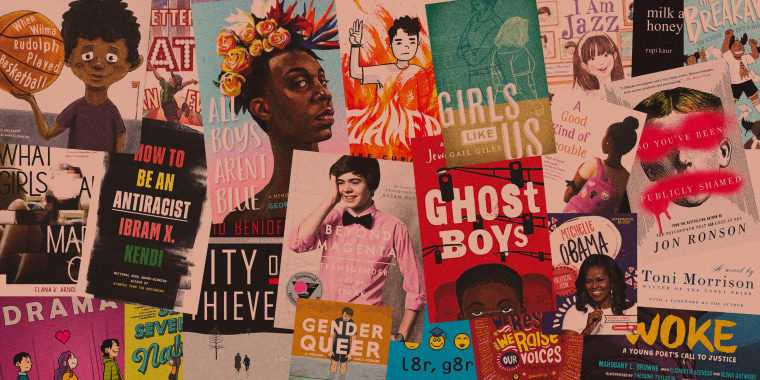Something I know from personal experience is that Melissa, by Alex Gino, is an amazing book that has been praised widely for its inclusion of the LGBTQ community. In 2016, it was awarded the Stonewall Children’s Book award. The book is about a transgender girl who wants to be Charlotte in her class production of Charlotte’s Web, but is not allowed to because her teacher says she is a “boy.” The novel used to be called George, but people complained that Alex Gino was deadnaming their character, and the title was changed to Melissa. While a lot of people think that Melissa is a great book that addresses the problems that transgender kids face, it has been banned by many school districts. The book has been moved up and down the American Library Association’s Top Ten Most Challenged Book list, from number three to number five to number one on the list, before becoming the first most banned book ever. The Wichita, Kansas public school system banned the book from its district libraries, and when the book was included in the Oregon Battle of the Books, two school districts removed their students from the competition in retaliation.
Those critical of the novel said the book had “sexual content,” of which there is none whatsoever, thereby mixing up sex with gender identity. Some critics went as far as to say that Melissa just did not go with or reflect “community values.” However, it is important to learn about real issues like this in the world, and these “community values” should be expanded to include all people. Some people simply disliked the novel because they thought a book about a transgender girl was not appropriate for children. Children should know about the real world, and they shouldn’t be banned from learning about what actually happens. Insisting that young people shouldn’t read these books signifies that transgender people or members of the broader LGBTQ community are somehow “wrong” and that their existence should be hidden.
While this news may be outrageous, this is not the only recent book to be banned by schools. New Kid, by Jerry Craft, is also under the status of “banned.” While Melissa was banned because it was about a transgender character, New Kid, a graphic novel about a Black boy from the Bronx who attends a school full of rich, white kids, was banned for bringing up the subject of racism. New Kid was banned from Texas schools after a parent had complained that it promoted “critical race theory,” which is not actually taught in public schools. What conservatives call “critical race theory” is actually just the history of racism in the United States. According to someone from the far right, the words “white people owned slaves” is critical race theory. Right-wingers are upset about people knowing the truth, because the truth is embarrassing, infuriating, and could very well help overturn the whole system.
As I move on, you will begin to see a pattern. Books that are banned are banned for the fact that reading about the topics they contain makes certain people “uncomfortable.” Another banned book, The Absolutely True Diary Of A Part-time Indian by Sherman Alexi, is a novel about a Native American boy living on a reservation struggling at his new all-white school. This book was banned in the Stockton, Missouri School District because of violence, bad language, and sexual content. Many banned books address issues that conservatives don’t want to address. The Absolutely True Diary Of A Part-time Indian is about racial injustice. In one scene from the novel, the main character punches a white boy for bullying him. Critics of this book claim this promotes violence, and, while this scene is indeed violent, it shows what the main character’s school is like and the violence that racism produces, and it impacts how the rest of the story works. This book was also banned for bad language, but the idea of swear words just circles around random words which have somehow been considered as “bad.” This book was also banned for “sexual references,” which are probably the scenes where the character talks about women’s bodies. While this is problematic in some ways, the book uses this to expand upon the character, and just because you dislike something in a book, doesn’t mean people shouldn’t be allowed to read it. The way this novel addresses these topics is realistic, but its right-wing critics use the novel’s references to racism and violence as a jumping off point to challenge it.
All of the challenges to these books either mix up terms or want to suppress certain topics. In Melissa, critics confuse sex and gender. In New Kid and The Absolutely True Diary of a Part-Time Indian, critics want to suppress conversations about racism and violence. Why do we need to tell young people that a topic is not appropriate for them, or that they can’t read a certain book? Why do some adults think that young people don’t have the ability to read difficult texts and think about their meaning? If they are concerned that young people will struggle with understanding these books on their own, all the more reason to teach them in schools. Books should not be banned; they should be discussed.
I am nine years old, but I don’t shy away from books with demanding content. Important questions and issues should not be hidden from young people because they might find them challenging or confusing. All books worth reading require discussion; no book requires banishment.
Originally published in Stone Soup










